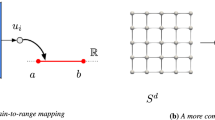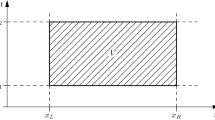Abstract
A three-dimensional H(curl)-elliptic optimal control problem with distributed control and pointwise constraints on the control is considered. We present a residual-type a posteriori error analysis with respect to a curl-conforming edge element approximation of the optimal control problem. Here, the lowest order edge elements of Nédélec’s first family are used for the discretization of the state and the control with respect to an adaptively generated family of simplicial triangulations of the computational domain. In particular, the a posteriori error estimator consists of element and face residuals associated with the state equation and the adjoint state equation. The main results are the reliability of the estimator and its efficiency up to oscillations in terms of the data of the problem. In the last part of the paper, numerical results are included which illustrate the performance of the adaptive approach.






Similar content being viewed by others
References
Ainsworth, M., Oden, T.: A Posteriori Error Estimation in Finite Element Analysis. Wiley, Chichester (2000)
Arnold, D., Falk, R., Winther, R.: Multigrid in H(div) and H(curl). Numer. Math. 85, 197–217 (2000)
Arnold, D., Falk, R., Winther, R.: Finite element exterior calculus, homological techniques, and applications. Acta Numerica 15(2006), 1–155 (2006)
Babuska, I., Strouboulis, T.: The Finite Element Method and its Reliability. Clarendon Press, Oxford (2001)
Bangerth, W., Rannacher, R.: Adaptive Finite Element Methods for Differential Equations. Lectures in Mathematics. ETH-Zürich. Birkhäuser, Basel (2003)
Beck, R., Deuflhard, P., Hiptmair, R., Hoppe, R.H.W., Wohlmuth, B.: Adaptive multilevel methods for edge element discretizations of Maxwell’s equations. Surv. Math. Ind. 8, 271–312 (1999)
Beck, R., Hiptmair, R., Hoppe, R.H.W., Wohlmuth, B.: Residual based a posteriori error estimators for eddy current computation. M2AN Math. Model. Numer. Anal. 34, 159–182 (2000)
Binev, P., Dahmen, W., DeVore, R.: Adaptive finite element methods with convergence rates. Numer. Math. 97, 219–268 (2004)
Buffa, A., Ciarlet Jr, P.: On traces for functional spaces related to Maxwell’s equations. part i. Math. Meths. Appl. Sci. 24, 9–30 (2001)
Carstensen, C., Hoppe, R.H.W.: Convergence analysis of an adaptive edge finite element method for the 2d eddy current equations. J. Numer. Math. 13, 19–32 (2005)
Carstensen, C., Hoppe, R.H.W.: Unified framework for an a posteriori error analysis of non-standard finite element approximations of H(curl)-elliptic problems. J. Numer. Math. 17, 27–44 (2009)
Cascon, J.M., Kreuzer, Ch., Nochetto, R.H., Siebert, K.G.: Quasi-optimal rate of convergence of adaptive finite element methods. SIAM J. Numer. Anal. 46, 2524–2550 (2008)
Costabel, M., Dauge, M.: Singularities of electromagnetic fields in polyhedral domains. Arch. Ration. Mech. Anal. 151, 221–276 (2000)
Dörfler, W.: A convergent adaptive algorithm for Poisson’s equation. SIAM J. Numer. Anal. 33, 1106–1124 (1996)
Eriksson, K., Estep, D., Hansbo, P., Johnson, C.: Computational Differential Equations. Cambridge University Press, Cambridge (1996)
Gaevskaya, A., Hoppe, R.H.W., Iliash, Y., Kieweg, M.: Convergence analysis of an adaptive finite element method for distributed control problems with control constraints. In: Leugering, G., et al., (eds.) Proc. Conf. Optimal Control for PDEs, Oberwolfach, Germany, Birkhäuser, Basel (2007)
Hintermüller, M., Hoppe, R.H.W.: Goal-oriented adaptivity in control constrained optimal control of partial differential equations. SIAM J. Control Optim. 47, 1721–1743 (2008)
Hintermüller, M., Hoppe, R.H.W., Iliash, Y., Kieweg, M.: An a posteriori error analysis of adaptive finite element methods for distributed elliptic control problems with control constraints. ESAIM Control Optim. Calc. Var. 14, 540–560 (2008)
Hiptmair, R.: Multigrid method for Maxwell’s equations. SIAM J. Numer. Anal. 36, 204–225 (1999)
Hiptmair, R.: Finite elements in computational electromagnetism. Acta Numerica 11, 237–339 (2002)
Hiriart-Urruty, J.B., Lemaréchal, C.: Convex Analysis and Minimization Algorithms. Springer, Berlin-Heidelberg-New York (1993)
Hoppe, R.H.W., Schöberl, J.: Convergence of adaptive edge element methods for the 3d eddy currents equations. J. Comp. Math. 27, 657–676 (2009)
Houston, P., Perugia, I., Schötzau, D.: A posteriori error estimation for discontinuous Galerkin discretizations of H(curl)-elliptic partial differential equations. IMA J. Numer. Anal. 27, 122–150 (2007)
Kolmbauer, M., Langer, U.: A robust preconditioned minres solver for distributed time-periodic eddy current optimal control problems. SIAM J. Sci. Comput. 34, B785–B809 (2012)
Li, R., Liu, W., Ma, H., Tang, T.: Adaptive finite element approximation for distributed elliptic optimal control problems. SIAM J. Control Optim. 41, 1321–1349 (2002)
Liu, W., Yan, N.: Adaptive Finite Element Methods for Optimal Control Governed by PDEs. Series in Information and Computational Science, vol. 41. Global Science Press, Hong Kong (2008)
Logg, A., Mardal, K.-A., Wells, G.N.: Automated Solution of Differential Equations by the Finite Element Method. Springer, Boston (2012)
Monk, P.: A posteriori error indicators for Maxwell’s equations. J. Comp. Appl. Math. 100, 173–190 (1998)
Monk, P.: Finite Element Methods for Maxwell Equations. Oxford University Press, Oxford (2003)
Nédélec, J.-C.: Mixed finite elements in \(\mathbb{R}^{3}\). Numer. Math. 35, 315–341 (1980)
Neittaanmäki, P., Repin, S.: Reliable Methods for Mathematical Modelling. Error Control and a Posteriori Estimates. Elsevier, New York (2004)
Schöberl, J.: A posteriori error estimates for Maxwell equations. Math. Comp. 77, 633–649 (2008)
Stevenson, R.: Optimality of a standard adaptive finite element method. Found. Comput. Math. 7, 245–269 (2007)
Tartar, L.: Introduction to Sobolev Spaces and Interpolation Theory. Springer, Berlin (2007)
Tröltzsch, F.: Optimal Control of Partial Differential Equations. Theory, Methods, and Applications. American Mathematical Society, Providence (2010)
Tröltzsch, F., Yousept, I.: PDE-constrained optimization of time-dependent 3D electromagnetic induction heating by alternating voltages. ESAIM M2AN 46, 709–729 (2012)
Verfürth, R.: A Review of a Posteriori Estimation and Adaptive Mesh—Refinement Techniques. Wiley-Teubner, New York (1996)
Vexler, B., Wollner, W.: Adaptive finite elements for elliptic optimization problems with control constraints. SIAM J. Control Optim. 47, 1150–1177 (2008)
Zhong, L., Chen, L., Shu, S., Wittum, G., Xu, J.: Optimal error estimates of the Nedelec edge elements for time-harmonic Maxwell’s equations. J. Comput. Math. 27(2009), 563–572 (2009)
Yousept, I.: Optimal control of quasilinear H (curl)-elliptic partial differential equations in magnetostatic field problems. SIAM J. Control Optim. 51, 3624–3651 (2013)
Yousept, I.: Optimal control of Maxwell’s equations with regularized state constraints. Comput. Optim. Appl. 52, 59–581 (2012)
Yousept, I.: Finite element analysis of an optimal control problem in the coefficients of time-harmonic eddy current equations. J. Optim. Theory Appl. 154, 879–903 (2012)
Zhong, L., Chen, L., Shu, S., Wittum, G., Xu, J.: Convergence and optimality of adaptive edge finite element methods for time-harmonic Maxwell equations. Math. Comp. 81, 623–642 (2012)
Acknowledgments
The first author acknowledges support by the NSF Grants DMS-1115658, DMS-1216857, by the German National Science Foundation within the Priority Programs SPP 1253, SPP 1506, by the German Federal Ministry for Education and Research (BMBF) within the projects BMBF-FROPT and BMBF-MeFreSim, and by the European Science Foundation (ESF) within the ESF Program OPTPDE.
Author information
Authors and Affiliations
Corresponding author
Additional information
Communicated by Ulrich Langer.
Rights and permissions
About this article
Cite this article
Hoppe, R.H.W., Yousept, I. Adaptive edge element approximation of H(curl)-elliptic optimal control problems with control constraints. Bit Numer Math 55, 255–277 (2015). https://doi.org/10.1007/s10543-014-0497-x
Received:
Accepted:
Published:
Issue Date:
DOI: https://doi.org/10.1007/s10543-014-0497-x
Keywords
- Optimal control of PDEs
- H(curl)-elliptic problems
- Curl-conforming edge elements
- Residual a posteriori error estimator
- Reliability and efficiency




